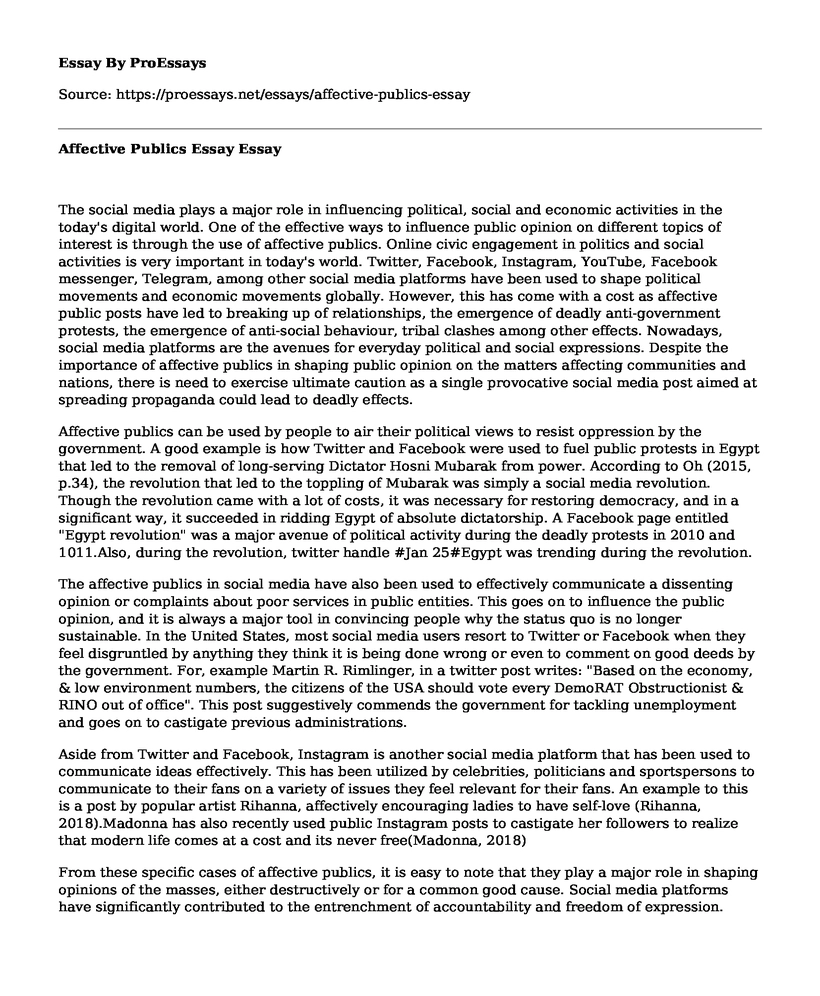The social media plays a major role in influencing political, social and economic activities in the today's digital world. One of the effective ways to influence public opinion on different topics of interest is through the use of affective publics. Online civic engagement in politics and social activities is very important in today's world. Twitter, Facebook, Instagram, YouTube, Facebook messenger, Telegram, among other social media platforms have been used to shape political movements and economic movements globally. However, this has come with a cost as affective public posts have led to breaking up of relationships, the emergence of deadly anti-government protests, the emergence of anti-social behaviour, tribal clashes among other effects. Nowadays, social media platforms are the avenues for everyday political and social expressions. Despite the importance of affective publics in shaping public opinion on the matters affecting communities and nations, there is need to exercise ultimate caution as a single provocative social media post aimed at spreading propaganda could lead to deadly effects.
Affective publics can be used by people to air their political views to resist oppression by the government. A good example is how Twitter and Facebook were used to fuel public protests in Egypt that led to the removal of long-serving Dictator Hosni Mubarak from power. According to Oh (2015, p.34), the revolution that led to the toppling of Mubarak was simply a social media revolution. Though the revolution came with a lot of costs, it was necessary for restoring democracy, and in a significant way, it succeeded in ridding Egypt of absolute dictatorship. A Facebook page entitled "Egypt revolution" was a major avenue of political activity during the deadly protests in 2010 and 1011.Also, during the revolution, twitter handle #Jan 25#Egypt was trending during the revolution.
The affective publics in social media have also been used to effectively communicate a dissenting opinion or complaints about poor services in public entities. This goes on to influence the public opinion, and it is always a major tool in convincing people why the status quo is no longer sustainable. In the United States, most social media users resort to Twitter or Facebook when they feel disgruntled by anything they think it is being done wrong or even to comment on good deeds by the government. For, example Martin R. Rimlinger, in a twitter post writes: "Based on the economy, & low environment numbers, the citizens of the USA should vote every DemoRAT Obstructionist & RINO out of office". This post suggestively commends the government for tackling unemployment and goes on to castigate previous administrations.
Aside from Twitter and Facebook, Instagram is another social media platform that has been used to communicate ideas effectively. This has been utilized by celebrities, politicians and sportspersons to communicate to their fans on a variety of issues they feel relevant for their fans. An example to this is a post by popular artist Rihanna, affectively encouraging ladies to have self-love (Rihanna, 2018).Madonna has also recently used public Instagram posts to castigate her followers to realize that modern life comes at a cost and its never free(Madonna, 2018)
From these specific cases of affective publics, it is easy to note that they play a major role in shaping opinions of the masses, either destructively or for a common good cause. Social media platforms have significantly contributed to the entrenchment of accountability and freedom of expression.
Conclusion
In conclusion, affective public posts play a major role in shaping communicative patterns. Social media has evolved greatly over the years. Despite the importance of social media as an avenue for free expression, its misuse can lead to catastrophic results. It is important that users do not use the social media forums to disseminate ethically unacceptable information and propaganda.
References
Madonna (2018).2 March. Available
At: https://www.instagram.com/p/BfzDXwdBTtI/?hl=en&taken-by=madonnaRihanna (2018) 22 April. Available
At: https://www.instagram.com/p/Bh3q7p_FooL/?hl=en&tagged=rihanna
Oh, O., Eom, C. and Rao, H.R., 2015. Research note-Role of Social Media in Social
Change: An analysis of collective sensemaking during the 2011 Egypt revolution. Information Systems Research, 26(1), pp.210-223
Cite this page
Affective Publics Essay. (2022, May 16). Retrieved from https://proessays.net/essays/affective-publics-essay
If you are the original author of this essay and no longer wish to have it published on the ProEssays website, please click below to request its removal:
- Tinikling Dance and Its Benefits
- Opening Speech
- Reign Over Me: Watching Movie Based on Trauma Essay
- Maya Lin and Chinese Heritage Essay
- William Branch's Battle With FCC Spotlights Media's Impact on Society - Essay Sample
- Movie Analysis Essay on The Battle of Algiers
- Research Paper Example on Influence of Advertising on Millennial Technology Purchases







